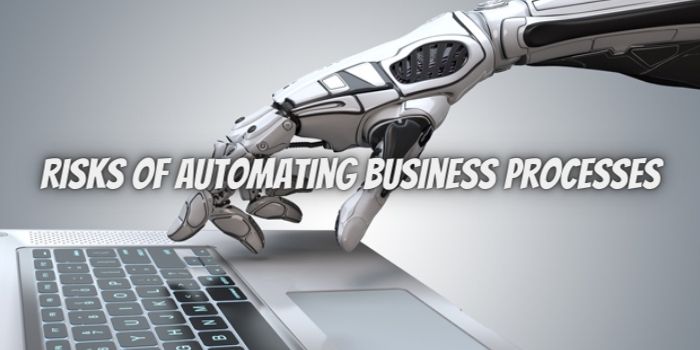Businesses are settling for new ways to increase efficiency, accuracy and also save money by replacing manual tasks with automated processes. Automating processes takes mundane, repetitive tasks and puts them in the care of robotic software that can complete the tasks exponentially faster than human employees can achieve.
Automation software can achieve consistent, high productivity without taking a break or losing energy. Additionally, the software can complete the tasks with higher accuracy and quicker time.
Also, as businesses take away mundane tasks from employees using automation, they give them more time for strategic, creative tasks. Automating business processes is helpful to thrive in an increasingly competitive landscape, but some risks come with the technology.
The Risks of Automating Business Processes
No technology is perfect, and automation is no different. Options will inundate you as you weigh UiPath vs. Power Automate. There are a multitude of benefits to adopting automation, but it also comes with its downsides. To make an informed decision, you need to be aware of the risks that come with automation.
Here are a few you should be mindful of:
Security Concerns
In a world driven by high demand for data, automated tools have had to handle massive amounts of valuable customer information to increase sales and improve productivity. That presents a security risk of data breaches, leaks, corruption, or theft.
While security measures and tools are available to protect data, they may still be susceptible to hackers. Many organizations aren’t ready for the security protocols that come with technology. Security protocols are continuously updated, but their data becomes vulnerable if the company skips an update. Even when the business invests in the best security software, a staffer with a weak password or who falls for a phishing scam can easily undo all the investment.
Furthermore, data is at the center of personalization, but worldwide, governments are concerned about data privacy, sovereignty, and security. New regulations, such as GDPR, have resulted in every company becoming liable for data integrity no matter the size or industry.
If the company adopts data collection automation, it will become subject to regulations. It will gain the benefits of automation, but it will be subject to regulation that it may not have the institutional capacity to handle. For example, a retail outlet that collects customer data will need to adopt additional protocols to comply with the laws.
High Capital Expenditure
Firms that automate work processes frequently dole out large sums of money to adopt and maintain the system. The financial commitments could prove financially tasking for the company in the long run.
Automation solutions can also become more expensive as the business scales up or technology advances. The high capital expenditure typically means that large enterprises are more adept at adopting automation than small businesses, which creates a more significant gap in competitive advantages.
Displacement of Workers
It’s not just blue-collar workers that have concerns about automation but white-collar workers as well. When workers who only have a specific skill for a particular job sense substitution by machines, they are very likely to experience hardship.
They may even resist the change, which can be detrimental to the company in a fast-changing world. Automation is taking over the insurance, legal, marketing, and financial services professions, to mention a few.
Without employee buy-in, automation will face an uphill battle. That is because those very employees will need to train and safeguard the automation software as it launches.
Top-level Monitoring is Required
Automated business processes require thorough monitoring to avoid glitches that can cause adverse effects on the company. If the software is processing thousands or millions of tasks per hour, a simple glitch can have a profound, compound impact on the business. As a risk management strategy, the company will have to invest in another tech to monitor any glitches.
Loss of Flexibility
Automation enables quick completion of rule-based tasks. It can only operate within those rules; the automation will hit a brick wall outside the rules. So when a scenario confronts an automation software, it doesn’t have the parameters to handle, it will perform worse than a human. Humans can think outside the box and solve problems with their creativity, but technology is programmed to behave in a particular way.
The rigidity of automation is why many people will prefer to talk to humans than machines when calling customer service. A human can better understand nuance, complexities, and informal language.
Manage the risks
Automation has enormous advantages for any company, but it comes with risks. Although the risks may sound significant, the advantages still outweigh them. So adopt automation and manage the risks to get the best results.




